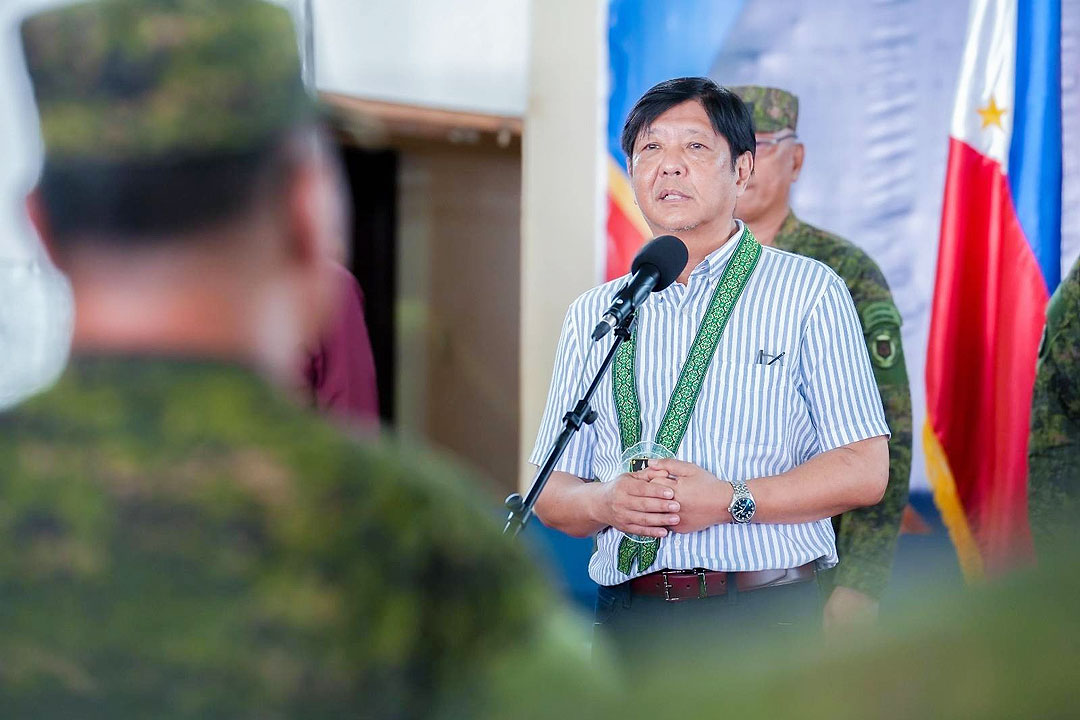Marcos tells army to prepare for contingencies as last defense line

By Kyle Aristophere T. Atienza, Reporter
PRESIDENT Ferdinand R. Marcos, Jr. on Wednesday asked the Philippine Army to boost relations with its foreign counterparts, highlighting the importance of international ties amid common security challenges.
External security threats to the Philippine have become more complex and unpredictable, the president said at the army’s 126th anniversary celebration.
“Continue to improve your relations with your counterparts overseas,” he told the troops. “Common security challenges necessitate a more concerted approach among like-minded nations.”
“Share information, learn from the best practices in the region to make our military better,” he added.
His remarks come amid increasing Chinese assertiveness in Philippine-claimed areas in the South China Sea.
Local foreign policy think tanks and experts have been urging the Philippine government to partner with as many countries as possible to deter China’s expansive activities at sea.
In February, the Philippines gave the United States access to four more military bases under their 2014 Enhanced Defense Cooperation Agreement (EDCA) — a move that has angered Beijing.
Lawmakers critical of Washington have also questioned the real intent of the EDCA expansion, fearing that the Philippines would be used as a staging ground for US military activities in the region.
Aside from the South China Sea dispute, the Indo-Pacific region has also been beset by tensions between China and the US over self-ruled Taiwan.
“To the army leadership, I am aware that the emerging threat to our territory and our emphasis on addressing this threat requires adjustments in our strategies,” Mr. Marcos said. “But I am confident that the Philippine Army, which has more than a century of experience, will be able to rise up to the task as it has always done.”
The Philippine leader said the army should always be fully prepared for any contingencies, “especially considering you are the country’s last line of defense against any external security threat.” “Be vigilant against elements that will undermine our hard-earned peace, our hard-earned stability,” he added.
“Working with like-minded states will ensure the country’s territorial integrity and national sovereignty, while also contributing to a rules-based international order,” Victor Andres C. Manhit, president of think tank Stratbase ADR, said in a Facebook Messenger chat.
“As we continue to pursue cooperation, we must always remain guided by our national interests, which include protecting our maritime rights, territorial integrity and the Filipino people,” he added.
‘DROP IN THE BUCKET’
Meanwhile, Mr. Marcos told reporters on the sidelines of the army event the four new EDCA sites would be scattered around the country.
“There are some in the north, there are some around Palawan, there are some further south,” he said. “There are various locations.”
The government would announce the specific locations soon, he said.
A former military official said last year the US had sought access to bases on the northern land mass of Luzon, the closest part of the Philippines to Taiwan, and on the island of Palawan, facing the disputed Spratlys Islands in the South China Sea.
Some foreign policy experts have urged the Marcos government to seek bigger compensation from the US for the risks that the EDCA expansion entails.
“Washington can provide and marshal investments from allies and partners such as Taiwan, Japan, Korea, Australia and Europe to compensate Philippine provinces hosting EDCA and offset possible losses from Chinese investments,” Lucio Blanco Pitlo III, a research fellow at the Asia-Pacific Pathways to Progress Foundation, told BusinessWorld.
He said the possibility of the Philippines getting dragged into the China-Taiwan conflict due to the EDCA expansion is a “serious risk that Manila has to bear in mind.”
While it might not alleviate the risk, a bigger reward from the US could lighten the opposition to EDCA especially from frontline provinces, the analyst said, citing concerns of some local officials who fear that the EDCA expansion might drive away Chinese investments.
Other countries where the US is trying to renew military access like the central Pacific island states of Palau, Marshall Islands and Federated States of Micronesia are “negotiating hard,” according to Mr. Pitlo.
He cited the case of Marshall Islands, which hosts the Ronald Reagan Ballistic Missile Defense Test Site at the US Army Garrison-Kwajalein Atoll and is rumored to get about $4 billion for the 20-year extension of its Compact of Free Association Agreement with the US.
So far, what is being reported on EDCA is an $82-million outlay for the existing five original locations — a drop in the bucket compared with what tiny Pacific atoll nations will be getting, he added.



